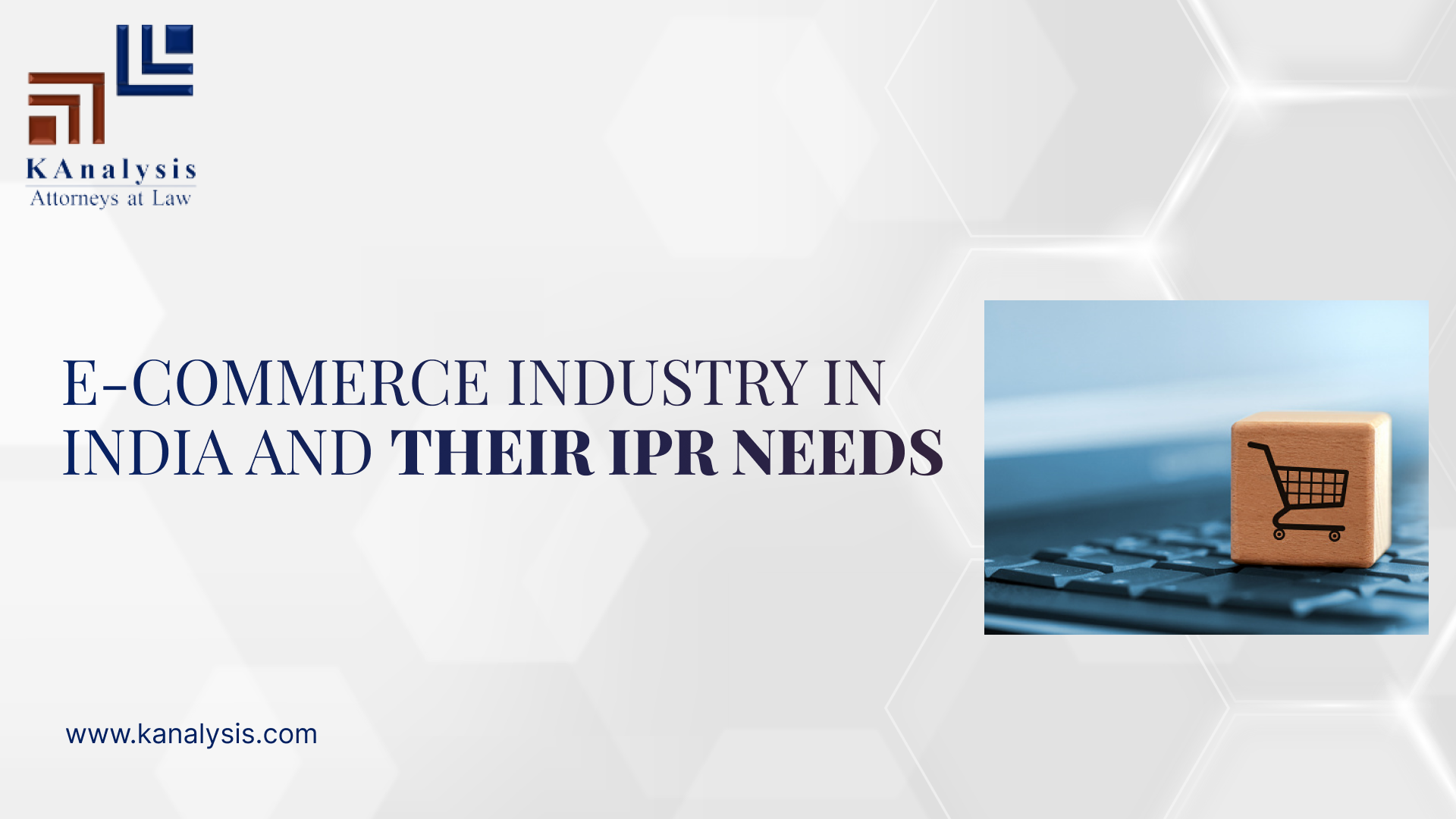India currently is on a front foot towards a digital revolution where e-commerce platforms are proving to be its backbone. After a digital boom during Covid-19, “Invest India” estimated the Gross Merchandise Value of the Indian e-commerce business to approx $55 billion in 2021. It is further anticipated to reach a gross merchandise value of $350 billion annually by 2030. Thus, a secure and consistent legal environment is necessary for a creative, forward-thinking, and advanced e-commerce industry to flourish as a provider of goods and services and to be a successful facilitator for meeting consumer expectations.
But with every revolution also comes a bouquet of challenges which ought not to be ignored. One of these trending challenges in the e-commerce industry is the ignorance of the IP rights by either the platform or the sellers. The intersection of e-commerce and intellectual property presents difficulties for courts and tribunals worldwide in determining various issues between the stakeholders. Thereby, this article discusses about a unique relationship between IP and e-commerce industry and tries to highlight their IP needs.
INTERACTION BETWEEN IPR AND E-COMMERCE
The intellectual property rights are crucial to e-commerce since they serve as a factor that enables a business to exploit its idea and in lieu of it also surpass competitors in the market and ultimately reap profits. Due to the fact that most people are unable to comprehend such rights and because its linkages to e-commerce are not readily apparent, despite its great worth, it is frequently disregarded. Nonetheless, IP and e-commerce are so inextricably linked with each other and interacts in such a manner that it can have a deep impact on a brand’s market value.
E-commerce often entails the sale of goods or services based on licensed intellectual property. Music, photos, graphics, software, articles, and numerous other kinds of intellectual property can all be sold through an e-commerce platform in the realm of digital goods. IPR is extremely critical in each of these situations since its important function is to safeguard the items value. Moreover, IP theft can potentially kill an online business if it is prevalent and is not stopped.
ROLE OF IP IN E-COMMERCE
The global digital economy is expanding and changing swiftly these days which has been greatly aided by more accessibility to the internet. Thus, knowing how important IPR is to e-commerce and how it affects the virtual marketplace holds a strong key towards this growth. The relevance of intellectual property rights is undeniable in context of e-commerce because it is only with such protection that many participants economic viability and reputation can be shielded from various forms of infringement. Since IP serves as the business’s capital, e-commerce companies must distinguish themselves from other modern enterprises. Here, the IPR offers various kind of protection in terms of patents, geographical indications, trademarks, copyrights, etc. in order to provide property rights to this special type of capital. The holder of this intellectual form of wealth gains absolute control over the intellectual property used in e-commerce and is able to legally gain a range of advantages from it.
Hence, in light of above, it can be ascertained that the Intellectual Property holds the following role/significance in the e-commerce industry:
- Business Protection: IPR is crucial in protecting a company’s primary commercial interests, as well as those of all its affiliates in the corporate domain. If IPR is not used or the laws governing IPR are not followed, it may result in serious IPR breaches, and the repercussions will undoubtedly harm a company’s reputation.
- Brand’s Image: Any brand selling or marketing its product through authorized sellers on an e-commerce platform is always prone to infringement of its IP rights. For instance, a well-known brand like ADIDAS image can be severely affected if counterfeit shoes with its trademark or deceptively similar mark like ABIDAS are sold on the e-commerce platform. Thus, having a strong IP protection helps to maintain the market value of these brands and at the same time enables a company to utilize its IP for financial gain and promote competition.
- Copyright Protection: The main problem in the digital age is establishing the balance between the rights of owners and general use that a copyright system aims to achieve. The information that makes up the subject area of e-commerce and the creative output that spans the internet are indeed covered by copyright. The unlawful copying, duplication, and dissemination of the work, along with its fast digitization, have resulted in considerable damages for the rights holders.
- Safeguarding Patent and Trademark Portfolio: A company’s patent and trademark portfolio has significant value to it, and thereby safeguarding it improves the company’s reputation and, undoubtedly, will lead to a considerable improvement in the financial condition of the organization as the online market notices the company that presents its operations in the light of the preserving their patent and trademark portfolios.
- Maintains Consumer Trust: Selling a genuine product online not only preserves the brands value but also maintains the consumer trust. A strong IP protection, hence also helps an e-commerce entity to retain its loyal customers.
VARIOUS CHALLENGES INVOLVED
E-commerce business owners may make use of various intellectual property rights to keep their products legally protected. The IP law provides exclusive control over intangible assets and simultaneously provides remedies against infringement. But still there arise a lot of issues that are constantly remained unresolved and these can be characterized as follows:
- Ownership Issues: There may be significant ownership concerns with IPR unless the agreement entered by these concerned parties does not expressly grant the IP rights. Any use of IPR belonging to a third party must have legal authorization. These difficulties should be explicitly stated in the disclaimer and IPR policy of such e-commerce entities, and brands should also frequently monitor how these platforms are being used.
- Counterfeit Products: Continuous sale of counterfeiting products are posing an immediate threat to the registered IP of various brands. This issue is not only limited to the domestic boundaries but has also transgressed internationally though many e-commerce platforms have now started taking steps against it. For instance, Amazon introduced Project Zero, its anti-counterfeiting tool, which stands for “zero tolerance for counterfeit goods” and consists of various distinct countermeasures such as automatic protection, which uses artificial intelligence software to help identify, block, and remove counterfeit goods and also uses manual protection.
- Liability Concern: Intermediary liability has been one of the constant issues globally since they have become the checkpoint of online market over the years and hence their accountability regarding the content listed or posted online through them has also become prominent. Recently, a number of IP infringement instances have surfaced in which internet intermediaries have been made parties for infringing content posted by third parties.
- Distribution of Content: The illegal online distribution of IP-protected music, movies, art piece, pictures, screenplays, and software has received a lot of attention in current times. The national copyright laws are frequently broken by these illicit downloading. The convenience with which digital files can be downloaded and sold on e-commerce platforms has made unlawful copying of content a serious issue, costing the owners of these rights millions of dollars in lost revenue.
- IP Jurisdictional Challenge in International Transactions: One of the major characteristics of an e-commerce platform is that transactions here can take place globally and allow IP to be used and license in multiple nations at once. Finding the infringer and enforcing IP rights when they are violated online are challenging due to the nature of e-commerce. Since such laws impacting IP are territorial in nature, it is unclear which courts will have jurisdiction over disputes connected to e-commerce and IP.
PREVALENT LAWS GOVERNING E-COMMERCE IN INDIA
- Consumer Protection (E-Commerce law) Rules, 2020: These rules have been notified in accordance with the Consumer Protection Act of 2019 in order to forbid unfair business practices in e-commerce, protect consumers’ interests, ensure that e-commerce platforms are transparent, and strengthen the laws that govern the same.
- Information Technology Act, 2000: Provisions pertaining to intermediary liability has been made under IT Act, 2000 where Section 79 states that an intermediary will not be liable for any third-party information made available or hosted by them, provided that the function of the intermediary is limited to providing access, and the transmission is not initiated, selected or modified by it. In addition to the standards already laid out in the IT Act, the Central government recently notified Information Technology (Intermediary Guidelines and Digital Media Ethics Code) Rules, 2021 stating the due diligence to be observed by an intermediary.
- IP Laws: In India, if there is any infringement of registered or unregistered IP on the e-commerce platforms, there are various remedies available under the Indian Copyrights Act 1957, The Patents Act 1970 and The Trademarks Act 1999.
CONCLUSION
It can be observed that in the dynamic and varied world of e-commerce and online businesses, equitable compliance with actions and practices cannot be attained without Intellectual Property Rights. With the exponential rise of technical breakthroughs, IP rights aid in securing and preserving the secrecy of business dealings while giving IP rights owners a real portion of the profits. Therefore, it would be accurate to argue that IP Rights serve as a safeguard for E-Commerce activities, the success of which is entirely contingent upon the adoption of strong IP Rights policies.
Without a doubt, intellectual property laws are necessary for the fair and ethical compliance of digital practices and operations, particularly in a sector as diverse and dynamic as e-commerce and retail. IPR in e-commerce aids in defending companies that use online platforms and also assist businesses in preserving and protecting their covert business operations as the internet retail market expands exponentially. IPR owners are able to claim a portion of the company’s revenues thanks to IP rights in e-commerce. As a result, it should be noted that IPR in e-commerce safeguards e-commerce activities, however, the practical application of IP Rights determines the success rate completely.
REFERENCES
- https://www.investindia.gov.in/sector/retail-e-commerce/e-commerce
- Amazon, Brand Protection Report, June 2022, available at: https://assets.aboutamazon.com/68/b7/27c5eeee4121971b3d330fd6c16c/amazon-brand-protection-report-2022.pdf
- WIPO, “Intellectual Property Issues Related to Electronic Commerce”, available at: https://www.iprsonline.org/sme/en/e_commerce/pdf/ip_ecommerce.pdf
- https://www.wipo.int/edocs/pubdocs/en/intproperty/856/wipo_pub_856.pdf


